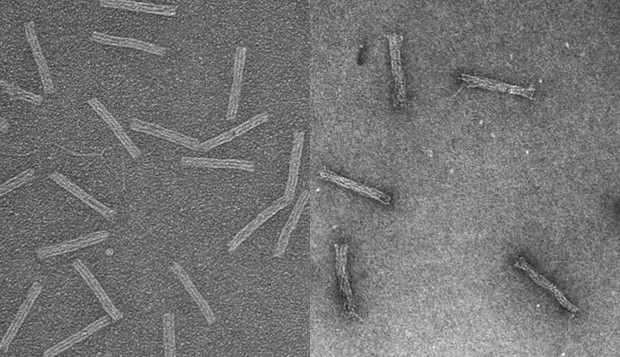Modified 'ninja' DNA used to kill drug-resistant cancers in Trojan Horse-style attack

A possible new treatment for drug-resistant cancer cells has been discovered, which uses a ninja-like cancer killer which is hiding inside tiny capsules of DNA. The drug-resistant leukaemia cells spit out the drug daunorubicin when it is administered by itself, but researchers have managed to encase it in DNA nanostructures.
The research, published in the journal Small, described the drug successfully infiltrating the cancer cells when hidden inside a capsule made entirely of DNA. Acting like a Trojan Horse, the DNA origami nanostructure has been designed by the scientists to hold a cancer-killing drug inside, right until the leukaemia cells cannot pump it out anymore. Once inside, there is little the cancer can do to stop the drug from killing it.
John Byrd, a researcher working on the study, said: "Cancer cells have novel ways of resisting drugs, and the exciting part of packaging the drug this way is that we can circumvent those defences so that the drug accumulates in the cancer cell and causes it to die."

The study
The scientists from Ohio State University developed the idea to use a drug-delivery technique called DNA origami, which uses artificially created DNA, and binds it together to form a tiny capsule. This process has already been used before for delivery throughout the body, but this is the first time it has been used to attack drug-resistant cancer cells.
Daunorubicin was added to the inside of the DNA capsule – which is just 15 nanometres wide and 100 nanometres long; about 50,000 times smaller than a five pence piece.
"The way daunorubicin works is it tucks into the cancer cell's DNA and prevents it from replicating," said researcher Christopher Lucas. "So we designed a capsule structure that would have lots of accessible DNA base-pairs for it to tuck into. When the capsule breaks down, the drug molecules are freed to flood the cell."
Using fluorescent micropscopes to watch cancer cells crumble
They tested the mechanism on acute myeloid leukaemia cells in mice, and recorded the results using a fluorescent microscope. They discovered the cancer cells accepting the DNA capsule as if it were usual food – completely oblivious to the fact that it contained the drug which would destroy it.
After the DNA was too far into the cell for it be thrown out, it unleashed the daunorubicin. The drug destroyed the cancer cells in under 15 hours.
The trials in mice were very successful, and now the researchers are hoping to test their idea in humans. They say that assuming the delivery system still works in humans, there should be no limit to the type of cancer cell it can be effective against.
© Copyright IBTimes 2025. All rights reserved.






















